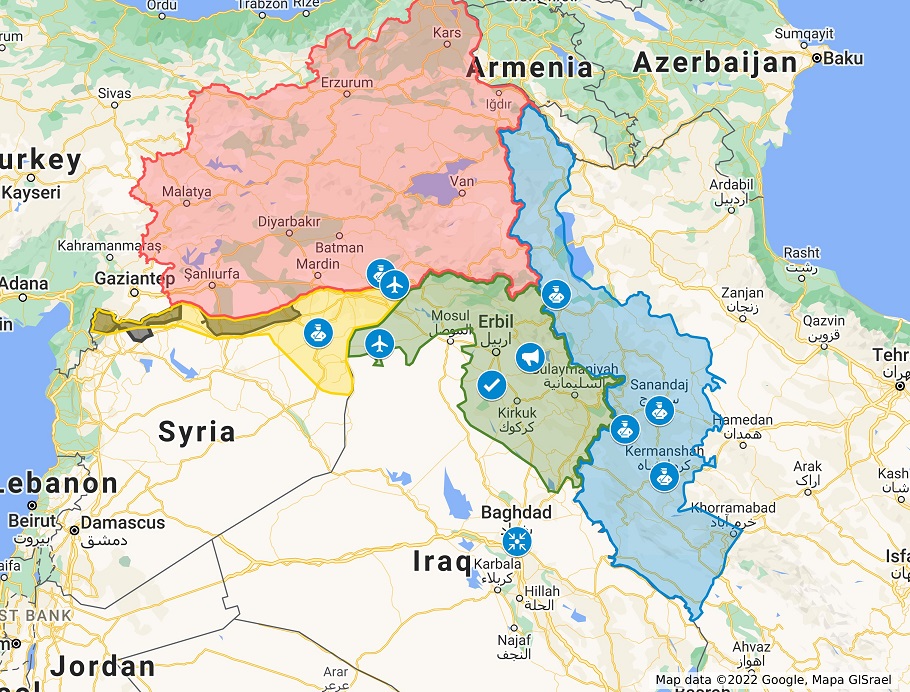1.6K
Iran
- Several Iranian teachers remain jailed for protesting poor wages and living conditions. The exiled Cooperation Center for Iranian Kurdistan’s Political Parties (CCIKP) released a statement supporting the teachers’ “legitimate demands” and lambasting the regime for “ignoring their demands over the past 40 years.” Furthermore, a teachers’ trade union reported financial problems drove a teacher to commit suicide in Minab on February 3.
- Iranian security forces arrested a Kurdish labor activist named Khabat Shakib in Sanandaj and a student named Khabat Waissi in Marivan’s Golchair village. Iranian authorities also transferred five Kurds to prison after they were interrogated by Iranian intelligence officers (Ettela’at) for several weeks in Oshnavieh. Local human rights organizations said the five Kurds were accused of “membership of Kurdish parties.” Concurrently, Paveh’s Islamic Revolutionary Court sentenced an 18-year-old female, Roya Mehedini, to one year in prison for “membership of a Kurdish party.” Lastly, the Hengaw Organization for Human Rights reported the Iranian regime arrested 50 Kurdish activists in January 2022.
- Iranian police killed a Kurdish man named Mohammed Ahmadi in Kermanshah after a car chase on Friday. Several local human rights groups accused the police of murdering Ahmadi, who was traveling with his family, for refusing to pay a bribe at a checkpoint. Also, in Kermanshah, a former Kurdish prisoner named Muhseen Mahmudi committed suicide after experiencing mental and financial issues. Mahmudi was previously imprisoned for participation in the 2019 protests and lost his sight after being shot by Iranian security forces. Finally, Islamic Revolutionary Guard Corps (IRGC) personnel severely wounded a Kurdish man named Maziar Azizi near Salas-e Babajani. Iranian authorities had accused Azizi of smuggling.
Iraq
- Iraq’s political parties remain deadlocked on the selection of the country’s next president and postponed Monday’s scheduled legislative session. While the Kurdistan Democratic Party (KDP) and Muqtada al Sadr’s coalition remain committed to Hoshiyar Zebari’s candidacy, the Patriotic Union of Kurdistan (PUK) and pro-Iranian Shia blocs still endorse Barham Salih. Granted, the Federal Supreme Court of Iraq has suspended Zebari’s candidacy until four lawmakers’ official complaints regarding Zebari’s failure to possess “a good reputation and integrity” are resolved. Zebari responded by saying he respects the court’s ruling and trusts the judiciary will confirm the state institutions’ finding that his candidacy has fulfilled all necessary conditions. Though the presidency is mostly symbolic in Iraq, prior political agreements have guaranteed the next president will name the country’s next prime minister.
- The Peshmerga concluded a joint operation with Iraqi forces in the Sargaran District of the “Disputed Territories.” The Ministry of Peshmerga Affairs claimed the operation was a success and said both sides worked together to search and clear the area of ISIS (Da’esh).
- Turkish warplanes struck the Makhmour refugee camp and several locations in the Yazidi town of Shingal on February 1, killing two camp guards and wounding numerous civilians. A group named Ahrar Sinjar then claimed responsibility for a rocket attack on a Turkish military base in Bashiqa and said, “ We have exhausted all stages of restraint amid the central government’s failure to protect our people and our city from the repeated Turkish attacks.” Ahrar Sinjar also warned of further attacks on the Turkish occupation unless negotiations “put an end to Turkey’s continuous aggression.”
Syria
- Turkish jets struck a power plant in Derek town on February 1, killing four Syrian Democratic Forces (SDF) guards and injuring five employees. Meanwhile, the SDF again accused Turkey of “directly helping” Da’esh terrorists plan the recent assault on Sina’a prison in al Hasakah and rebuked its “use of mercenaries to create chaos” in northeastern Syria. That said, the SDF completed clearing operations in Sina’a prison last Wednesday and arrested two Da’esh suicide bombers in Manbij. Simultaneously, UNICEF Representative in Syria Bo Viktor Nylund visited the prison and inquired about the situation of the Da’esh children known as the “Cubs of the Caliphate.” Separately, US President Joe Biden said the US-led coalition would continue working with the SDF and the Peshmerga during remarks given after the counterterrorism operation that killed Da’esh’s leader, Abu Ibrahim al-Hashimi al-Qurashi, in Idlib on Thursday.
Turkey
- Pro-Kurdish Peoples’ Democratic Party (HDP) criticized the Turkish government for bombing Kurds in Iraq and Syria last week. The HDP said Turkey’s attacks “demonstrate, yet again, the failure of the Turkish government to treat the Kurdish issue at home or abroad as anything other than a military issue to be met with sheer force.” The HDP voted against the Turkish military invasion in both Iraq and Syria.
- Turkish police attacked protesters in front of Istanbul after dozens of people demonstrated against the increasing number of death cases in prisons. According to rights groups, seventeen prisoners have died since December of 2021. The protest, part of the “Solidarity with Prisoners” initiative, attempted to deliver a speech in front of a forensic medicine institute, but the police prevented it and arrested several activists. The HDP supported the protest, which many relatives of victims attended.
- The “Kobani Trials” against 108 Kurdish and HDP politicians resumed on Monday amid strong HDP rejection of the process, calling it “bogus charges” and political cases. Furthermore, the Turkish police arrested several Kurds and HDP members, including three in Idil on Wednesday and three HDP members in Mardin’s Kiziltepe. Meanwhile, the HDP lawmaker Abdullah Koç demonstrated against the Konya court’s decisions and accused the court of “covering up of facts” in the hate crime case of a Kurdish family that was killed last summer. The court refuses to mention the racism factor in the massacre when a Turkish nationalist killed seven family members in Konya. “There are serious obstacles to expanding the investigation and uncovering the real perpetrators,” said Koç.

